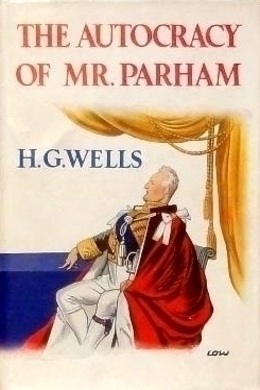
The Autocracy of Mr. Parham
His Remarkable Adventures in This Changing World
by H. G. Wells
subjects: Fiction
-
EPUB 324 KB
-
Kindle 393 KB
-
Support epubBooks by making a small $2.99 PayPal donation purchase.
This work is available for countries where copyright is Life+70 or less.
Description
Mr Parnham is in a quandary. Sir Bussy Woodcock has invited him to a siance and Mr Parnham is more than a little keen to keep the acquaintance going - after all, the great financier might just be his ticket to fame and fortune. But to a siance? Damned silly nonsense all this medium business! Just at the point of giving up Sir Bussy once and for all, Mr Parnham has one final change of mind and decides to go along after all. And so he does - with some very interesting results.
328 pages with a reading time of ~5 hours (82115 words), and first published in 1930. This DRM-Free edition published by epubBooks, 2014.
Community Reviews
There are currently no other reviews for this book.
Excerpt
For a time Mr. Parham was extremely coy about Sir Bussy Woodcock’s invitation to assist at a séance.
Mr. Parham did not want to be drawn into this séance business. At the same time he did not want to fall out of touch with Sir Bussy Woodcock.
Sir Bussy Woodcock was one of those crude plutocrats with whom men of commanding intelligence, if they have the slightest ambition to be more than lookers-on at the spectacle of life, are obliged to associate nowadays. These rich adventurers are, under modern conditions, the necessary interpreters between high thought and low reality. It is regrettable that such difficult and debasing intervention should be unavoidable, but it seems to be so in this inexplicable world. Man of thought and man of action are mutually necessary–or, at any rate, the cooperation seems to be necessary to the man of thought. Plato, Confucius, Machiavelli had all to seek their princes. Nowadays, when the stuffing is out of princes, men of thought must do their best to use rich men.
Rich men amenable to use are hard to find and often very intractable when found. There was much in Sir Bussy, for example, that a fine intelligence, were it not equipped with a magnificent self-restraint, might easily have found insupportable. He was a short ruddy freckled man with a nose sculptured in the abrupt modern style and a mouth like a careless gash; he was thickset, a thing irritating in itself to an associate of long slender lines, and he moved with an impulsive rapidity of movement that was startling often and testified always to a total lack of such inhibitions as are inseparable from a cultivated mind. His manners were–voracious. When you talked to him he would jump suddenly into your pauses, and Mr. Parham, having long been accustomed to talk to muted undergraduates, had, if anything, developed his pauses. Half the good had gone from Mr. Parham if you robbed him of these significant silences. But Sir Bussy had no sense of significant silences. When you came to a significant silence, he would ask, “Meantersay?” in an entirely devastating manner. And he was always saying, “Gaw.” Continually he said it with a variety of intonations, and it never seemed to be addressed to anyone in particular. It meant nothing, or, what was more annoying, it might mean anything.
The fellow was of lowly extraction. His father had driven a hansom cab in London, while his mother was a nurse in a consumption hospital at Hampstead–the “Bussy” came from one of her more interesting patients–and their son, already ambitious at fourteen, had given up a strenuous course of Extension Lectures for an all- time job with a garrulous advertisement contractor, because, said he, there was “no GO in the other stuff.” The other “stuff,” if you please, was Wordsworth, the Reformation, Vegetable Morphology, and Economic History as interpreted by fastidious-minded and obscurely satirical young gentlemen from the elder universities.
Mr. Parham, tolerant, broad-minded, and deliberately quite modern, was always trying to forget these things. He never really forgot them, but whenever he and Sir Bussy were together he was always trying very hard to do so. Sir Bussy’s rise to wealth and power from such beginnings was one of the endless romances of modern business. Mr. Parham made a point of knowing as little about it as possible.
